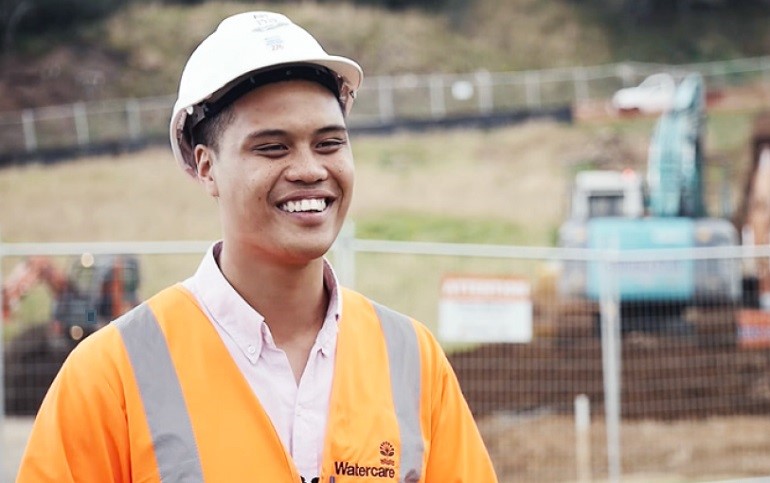Tāmaki Makaurau future workforce – Exploring 3 workforce futures
When looking at the region’s future workforce, the RSLG is considering the role of digital skills and digital technology as an enabler for all other sectors, as well as a sector within itself for both improved workforce development, education and learning.
On this page
He aha te mea nui o te ao?
He tangata, he tangata, he tangataWhat is the most important thing in the world?
It is the people, it is the people, it is the people.

Faiz salim – Civil Engineer
Photo: #BuildAKL
It is becoming increasingly important to secure the future of the region’s workforce as machine learning and robotics continue to enter the workplace, and digital skills are needed for every job. The adoption of these basic and advanced digital skills is essential to provide workers with the composite skills required to gain employment and contribute to the wider economy, and their adoption is likely to enable employees to shift from manual to technically skilled roles.
Digital Technology Learning Curriculum(external link) — Ministry of Education
COVID-19’s impact has been disproportionately large for Tāmaki Makaurau as the region’s communities and businesses start to get back on their feet. This shift may contribute to addressing the region’s wealth inequity, especially in the southern industrial centres. The future workforce will be more digitally skilled, and digital technology will be ubiquitous with artificial intelligence and machine learning across all industries. It is important that the gains from technology in the workforce are not only shared equally across the region, but are also able to lift groups that have not benefited from the growth during recent decades, especially those who live in the region’s south and west.
The RSLG wants to work with regional partners and stakeholders to develop a digitally skilled workforce, with no one left behind, while also ensuring the current and future workforce has the necessary skills and capability to grasp emerging future development opportunities. This includes innovation in workforce development, widespread technology uptake (telehealth, e.g., COVID-19 apps), and welcome recognition of the importance of essential and service workers.
As Tāmaki Makaurau continues to be a sought-after destination for workers, the region will continue to create jobs. By 2027 it is predicted there will be around 105,699 more jobs with the largest increase in Creative, Culture, Recreation and Technology (up by 14.5%), Community Health Education and Social Services (up by 14.4%), Services (up by 9.3%), Manufacturing, Engineering and Logistics (up by 7.9%), People, Food and Fibre (up by 4.9%) and Construction and Infrastructure (up by 2.4%).
The growth in South Auckland will be underpinned by the Construction sector but there is also likely to be strong growth in transport, postal and warehousing jobs. Forecasts also suggest manufacturing will remain important for West Auckland, but most growth will be in the Construction sector and in public services that support a growing population, including education, training, and healthcare. Strong employment growth is also forecast in technology-led sectors such as financial services, security payments, data and analytics, and in digital creative and design.
It is now more important than ever to invest workforce futures in digital skills as well as green skills to allow for climate adaption initiatives that support the construction industry of the region. When thinking of green jobs, it is common to imagine windfarms, solar power, and other types of renewable energy. However, as industries become more environmentally friendly, every job has the potential to be greener. A ‘green job’ produces goods or provides services that directly benefit the environment. It could also be a job that helps industries lower their carbon footprint.
As Tāmaki Makaurau continues to play its role in delivering the Paris Agreement targets to keep temperature increases below dangerous levels (e.g., 1.5°C) in line with Auckland Council’s Climate Plan, it will become increasingly important for the region’s workforce to have access to green learning opportunities
Auckland’s Climate Action Plan(external link) — Auckland Council

